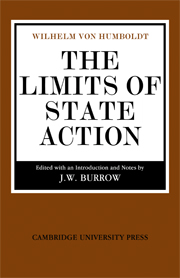Book contents
- Frontmatter
- Contents
- Editor's Introduction
- ON THE LIMITS OF STATE ACTION
- NOTE ON THIS EDITION AND TRANSLATION
- Contents
- CHAPTER I Introduction
- CHAPTER II Of the individual man, and the highest ends of his existence
- CHAPTER III On the solicitude of the State for the positive welfare of the citizen
- CHAPTER IV Of the solicitude of the State for the negative welfare of the citizen—For his security
- CHAPTER V On the solicitude of the State for security against foreign enemies
- CHAPTER VI On the solicitude of the State for the mutual security of the citizens—Means for attaining this end—Institutions for reforming the mind and character of the citizen—National education
- CHAPTER VII Religion
- CHAPTER VIII Amelioration of morals
- CHAPTER IX The solicitude of the State for security more accurately and positively defined—Further development of the idea of security
- CHAPTER X On the solicitude of the State for security with respect to actions which directly relate to the agent only (Police laws)
- CHAPTER XI On the solicitude of the State for security with respect to such of the citizens' actions as relate directly to others (Civil laws)
- CHAPTER XII On the solicitude of the State for security as manifested in the juridical decision of disputes among the citizens
- CHAPTER XIII On the solicitude for security as manifested in the punishment of transgressions of the State's laws (criminal laws)
- CHAPTER XIV On the care of the State for the welfare of minors, lunatics, and idiots
- CHAPTER XV Measures for the maintenance of the State—Completion of the theory
- CHAPTER XVI Practical application of the theory proposed
- Other works by Wilhelm von Humboldt
- Select Bibliography
- Index
- CAMBRIDGE STUDIES IN THE HISTORY AND THEORY OF POLITICS
CHAPTER VII - Religion
from ON THE LIMITS OF STATE ACTION
Published online by Cambridge University Press: 05 February 2015
- Frontmatter
- Contents
- Editor's Introduction
- ON THE LIMITS OF STATE ACTION
- NOTE ON THIS EDITION AND TRANSLATION
- Contents
- CHAPTER I Introduction
- CHAPTER II Of the individual man, and the highest ends of his existence
- CHAPTER III On the solicitude of the State for the positive welfare of the citizen
- CHAPTER IV Of the solicitude of the State for the negative welfare of the citizen—For his security
- CHAPTER V On the solicitude of the State for security against foreign enemies
- CHAPTER VI On the solicitude of the State for the mutual security of the citizens—Means for attaining this end—Institutions for reforming the mind and character of the citizen—National education
- CHAPTER VII Religion
- CHAPTER VIII Amelioration of morals
- CHAPTER IX The solicitude of the State for security more accurately and positively defined—Further development of the idea of security
- CHAPTER X On the solicitude of the State for security with respect to actions which directly relate to the agent only (Police laws)
- CHAPTER XI On the solicitude of the State for security with respect to such of the citizens' actions as relate directly to others (Civil laws)
- CHAPTER XII On the solicitude of the State for security as manifested in the juridical decision of disputes among the citizens
- CHAPTER XIII On the solicitude for security as manifested in the punishment of transgressions of the State's laws (criminal laws)
- CHAPTER XIV On the care of the State for the welfare of minors, lunatics, and idiots
- CHAPTER XV Measures for the maintenance of the State—Completion of the theory
- CHAPTER XVI Practical application of the theory proposed
- Other works by Wilhelm von Humboldt
- Select Bibliography
- Index
- CAMBRIDGE STUDIES IN THE HISTORY AND THEORY OF POLITICS
Summary
Besides the education of the young, there is another important means of exercising an influence on the morals and character of a nation, through which the State endeavours to educate, as it were, the full-grown man, accompanies him throughout the whole course and conduct of his life—his ways of thinking and acting—and aims at giving them some specific and preconceived direction, or forestalling probable deviations from the path it prescribes—this is religion.
History shows us that all States have used this source of influence, but with very different designs, and in very different degrees. In the ancient nations it was completely interwoven with the political constitution, it was, in fact, a guiding principle and essential pillar of the State; and hence all that I have said of other ancient institutions, applies no less aptly to religion. When the Christian religion, instead of the earlier local deities of nations, taught men to believe in a universal God of humanity, thereby throwing down one of the most dangerous barriers which separated the different tribes of the great human family from each other; and when it thus succeeded in laying the foundation for all true human virtue, human development, and human cooperation, without which, enlightenment and even science and learning would have long, and perhaps always, remained the rare property of a few; it also directly worked to loosen the strong bond that formerly existed between religion and the political constitution.
- Type
- Chapter
- Information
- The Limits of State Action , pp. 55 - 70Publisher: Cambridge University PressPrint publication year: 1969



